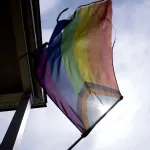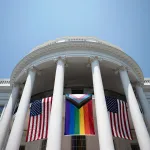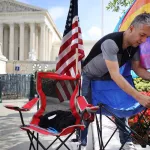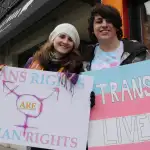For Chris Sanders, June 15 changed everything.
That day, the U.S. Supreme Court ruled that Title VII of the Civil Rights Act of 1964 protected LGBTQ people against work discrimination.
“We would not be able to get a piece of legislation through our general assembly that does the same thing,” said Sanders, the executive director of the Tennessee Equality Project, a statewide LGBTQ rights organization.
But though it was the final word for many, the landmark national ruling could be a hollow win for LGBTQ people facing workplace hostility, according to advocates. The Trump administration has been uneven in its enforcement of the Bostock v. Clayton decision. This imprecision could leave an estimated 3.6 million workers unclear of their rights when they are fired or denied job opportunities for being gay, bisexual, transgender or queer.
The Department of Justice traditionally enforces new laws by issuing non-binding guidance, aimed at alerting the public and other agencies to their rights and responsibilities. Federal agencies — like the Department of Labor, the Equal Employment Opportunity Commision and the Department of Education — then take those instructions and craft their own. But so far, the DOJ has not withdrawn old guidance no longer in compliance with the law and issued a new one. The department did not respond to a request from The 19th to comment.
In 2017, the DOJ argued in that Title VII, which bars discrimination on the basis of sex, does not cover gay or transgender people because Congress has not passed specific LGBTQ protections. The department submitted a brief to the Supreme Court last year arguing the same in the cases that ultimately secured LGBTQ workplace protections. Its 2017 memo regarding trans workers has not been withdrawn.
“That memo should be rescinded immediately,” said LGBTQ law group Lambda Legal’s Omar Gonzalez-Pagan.
On July 16, Lambda Legal, the Human Rights Campaign, the National Women’s Law Center and other advocacy organizations sent a letter to Attorney General William Barr, urging him to direct agencies to release guidance on the law, adding that failing to “would undoubtedly result in needless confusion.”
“The Department of Justice is not only appropriately positioned to coordinate implementation of the Bostock decision across the federal government, but has historically undertaken this role,” the letter stated.
Robin Maril, associate legal director for LGBTQ advocacy organization the Human Rights Campaign, said those guidelines would go beyond shielding employees.
“I think that the purpose of sort of the coordinating efforts of the Department of Justice is to make sure that not only do people know their rights, but that the covered entities know their obligations,” Maril said. “Silence, inaction and a wrong and dangerous message opens up other people to liability if they end up being bad actors.”
Businesses need to be educated about the mandate, she argued. Without that information, they might be breaking the law without evening knowing it.
Other federal agencies could craft their own guidance without waiting for the DOJ. The Department of Labor issues annual posters alerting workers to their rights, including notices that list prohibited bases for discrimination including race, age and disability.
Edwin Nieves, a spokesperson for the Department of Labor, expressed confusion over the suggestion that his agency would have a role in enforcing the law.
“Bostock v. Clayton County was a Supreme Court ruling which is DOJ,” Nieves said in an email.
The Equal Employment Opportunity Commission has issued its own guidance in the wake of the ruling, stating that a woman cannot be legally fired for being married to a woman if a man would not be fired for the same reason. The EEOC website also uses the example of a boss firing “an employee because that person was identified as male at birth, but uses feminine pronouns and identifies as a female.”
“Other information, like the brochure on Preventing Employment Discrimination Against Lesbian, Gay, Bisexual or Transgender Workers, is still being reviewed,” Kimberly Smith-Brown, a spokesperson for the EEOC told The 19th via email. Brown added that the EEOC was still updating its website to reflect the ruling.
Gonzalez-Pagan still wants other agencies to correct what he says is now incorrect guidance. He cites a series of rollbacks transgender protections under the Department of Education starting in 2017 that rest on the argument that sex discrimination excludes gender identity.
Democractic members of Congress claim that that the Trump administration has hinged nearly all of its anti-LGBTQ policy on the claim that Title VII protections don’t include sexual orientation and gender identity.
On July 9, more than 100 House and Senate members called on the president to direct federal agencies to “review of all regulations, executive orders and agency policies that implicate legal protections for LGBTQ individuals under federal civil rights laws.” The letter cites 32 policies that lawmakers claim the administration must rescind.
Advocates fear any obstacles that might add to job losses among LGBTQ people as the coronavirus ravages the nation. Data suggests that LGBTQ Americans have been particularly vulnerable to the pandemic. According to the Human Rights Campaign, one in five LGBTQ people lived in poverty as of 2018, and more than twice the number of LGBTQ people work in the particularly hard-hit restaurant industry (15 percent) as the general population (6 percent).
Sanders worries that many small and mid-size Tennessee business owners aren’t aware that the rules have changed. Until June 15, Tennessee was among 21 states that lacked LGBTQ anti-discrimination protections.
Without clear guidance from the DOJ that enforces the ruling, people will likely have to sue their employers themselves, something that advocates say is unlikely.
“The problem with that is, is that it means people will be discriminated against,” Sanders said. “They’ll have to file suit, and there’s that lag time when they’ll be unemployed unjustly, struggling financially. And there’s a pandemic.”
Under those circumstances, he said, many just won’t go to court.





